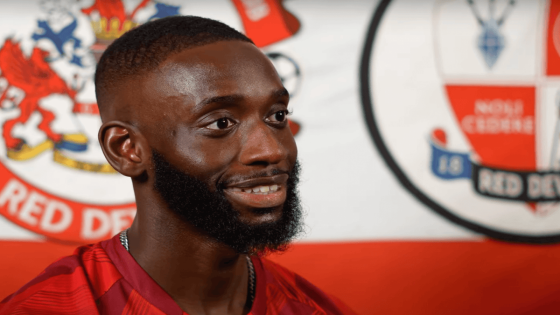“It felt like my second bite of the cherry, my second chance,” says 27-year-old striker Muhammadu Faal, describing his mood after signing for League One side Crawley Town this summer. His arrival was publicly announced by the club, from the third tier of English football, on July 22.
“It seemed like the perfect opportunity.”
Less than three months later, Faal’s attitude to football has changed. He has lost the opportunity to play at the highest level in his career yet, and to buy a dream home for his family.
“Some days I wake up and I just think, ‘I just don’t know if I can do it’,” he says. “I want to continue. But I don’t know. Every day is a challenge.”
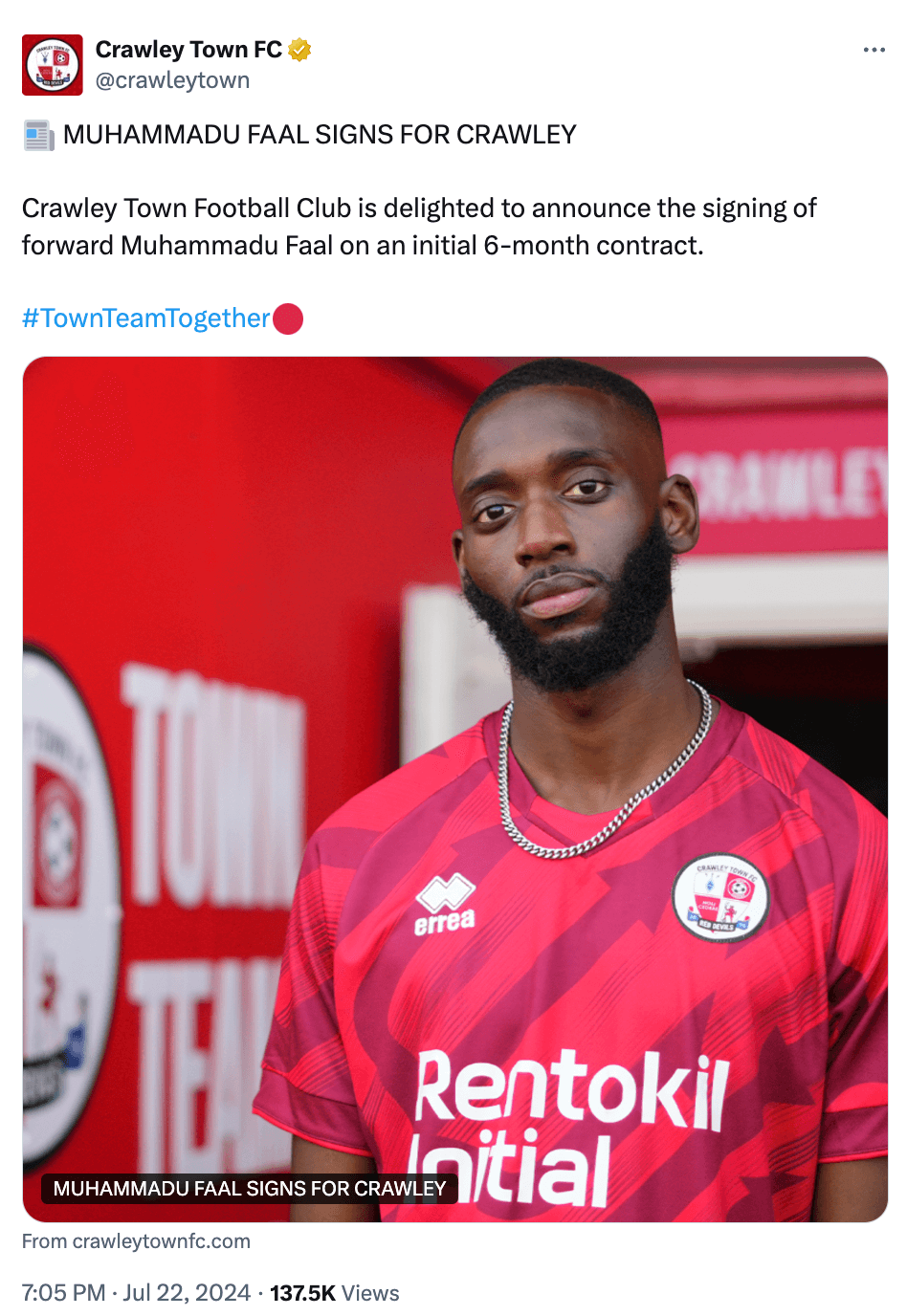
After fighting his way up the divisions for a decade, Faal thought Crawley was the opportunity he’d longed for — but it quickly turned sour. His case shows how disposable players can be.
The details that Faal has described to The Athletic include:
- Being falsely told by the club that he had failed his medical, which he says they later explained as a “miscommunication”
- Crawley telling him ‘no negotiating’ on a contract which would be found invalid by the English Football League
- The club subsequently refusing to alter the terms of the contract to meet EFL regulations
- Crawley wrongly claiming on social media that he’d joined another club for a transfer fee
- The saga’s impact on his mental health
Crawley declined to comment when contacted by The Athletic.
Faal grew up on the Stamford Hill estate in north London, dreaming of a career in professional football. For much of his childhood, this did not appear realistic. The forward was never at an academy, and trials at the likes of Norwich City, Sheffield Wednesday and Southend United never amounted to anything due to his slim build.
After an agent spotted him playing at his school as a 17-year-old, Faal spent two years in Italy’s Serie C and D, the third and fourth divisions, with L’Aquila, before moving back to the United Kingdom to begin his non-League journey. The goals started to come.
He scored 55 times in 66 appearances across two spells at Enfield Town, 28 in 66 for Havant & Waterlooville, and spent last season with Maidstone United, including their dream run to the last 16 of the FA Cup.
Midway through his time at Enfield, Faal moved to Bolton Wanderers of League One for his shot at the professional game. However, injuries and the Covid-19 pandemic disrupted his time there — and the opportunity slipped by.
In the intervening four years, playing mainly in the sixth-tier National League South, Faal had backed himself to return to that level. When his agent informed him of interest from Crawley, freshly promoted from League Two, it felt like the opportunity for redemption.
“The first time that I’d played in the EFL, I was young, maybe I was ready, maybe I wasn’t,” Faal says. “But I felt way more equipped with this chance to go ahead and do what I needed to do.”
It felt like the big breakthrough.
Faal had just had his first daughter, Ruqayya, and the terms which were being discussed with Crawley would allow him and his wife to buy their first family home. “It was a big two-bedroom house,” he says. “It had a garden where my child could play. I was excited.”
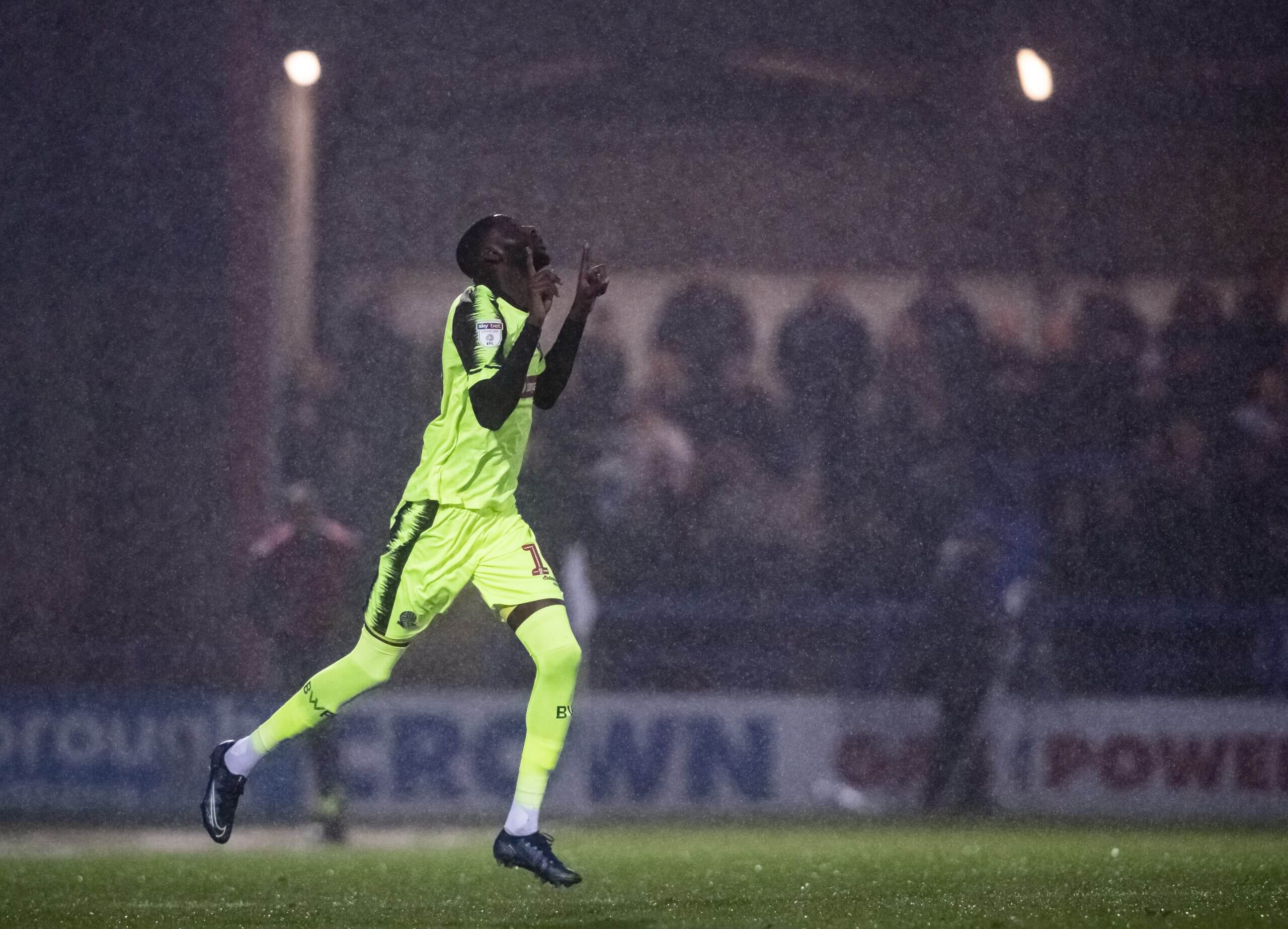
During talks, Faal says he was told by Crawley’s football leadership that there was no room for negotiations on the finances. That was fine — the money on offer was more than he had earned in his life. He says all parties agreed a deal quickly.
“When Crawley became interested, I thought that this was the chance of a lifetime,” he says. “I couldn’t miss it. Great playing style, good manager… it doesn’t matter about the terms — I have to take it.”
Faal signed the contract on July 15. Three days later, a Thursday, he completed his medical, with signing pictures taken the same day.
Concerned over the ensuing weekend that the results were taking longer than usual to come through, he made contact with Crawley’s physio, who told him there was nothing to be concerned over. But on the Sunday evening, Faal received a call from the club’s sporting director, Tobias Phoenix.
“He told me I’d failed my medical,” Faal recalls. “And I was perplexed. I just asked him, ‘How is this possible?’ And Phoenix said, ‘The deal’s off because you failed’. He said he didn’t want to disclose on what grounds.”
Before signing for Crawley, Faal had been worried about Phoenix’s presence at the club. The sporting director had spent 10 months at Bolton as head of football operations, a stint during which his transfer policy was widely criticised by fans, and the reasons why he left the job after such a short spell were never publicly explained. His arrival at Crawley was never announced by the club. Faal’s time at Bolton coincided with Phoenix’s tenure.
“When I was at Bolton, he was the reason that I left,” says Faal. “From August to November, I broke my foot and was injured for three months. As soon as I came back, he told me I had to leave and couldn’t stay, made threats of sending me to train with the young kids. He made my time at the club miserable.
“I only knew he was involved at Crawley the day before I signed. Shivers went down me — ‘Could he potentially make my time here worse again?’”
After being told the news about his medical, Faal called his agent, bemused. Within 24 hours, a meeting had been called, involving Faal, his agent, and virtually all of Crawley’s footballing decision-makers — chairman Preston Johnson, vice-chairman Ben Levin, their manager at the time Scott Lindsey, the head physio, and Phoenix.
“During the meeting, they concluded that there had been a miscommunication, and they were going to sign me,” says Faal. “The chairman said they wanted to have me on board, and he didn’t want there to be any bad blood between us.”
The move was back on. That day, he was announced as a Crawley player, and appeared on the club’s social media channels.
Later, he claims he was told by a member of club staff there had been no problem with his medical.
To Faal’s knowledge, at this point he was a Crawley player — though his agent was still pressing the club for a finalised copy of the contract.
He joined up with the squad, was a full participant in training, and appeared in pre-season. On July 27, he played in a friendly against Premier League side Crystal Palace, who fielded an almost full-strength side. After a career spent trying to maximise his potential, the top felt tangible.
Faal picked up a small injury, but pushed through the pain barrier in an attempt to impress. When the first game of the League One season arrived, at home against Blackpool, Faal was not expecting to start, but it was still a surprise when he was tapped on the shoulder by manager Lindsey — who told him the club needed to prioritise other players’ registrations after a change of secretary.
“I said: ‘OK, no problem — I’ll sit this one out’,” Faal remembers, explaining he always had a good relationship with Lindsey. “He told me they’d try and get my registration sorted for the Carabao Cup game the following Tuesday.”
However, on August 12, one day before that cup match against Swindon Town, Faal was told by Lindsey that there had been a further setback.
He did not go into details but the problem was that the contract which Faal had signed was for six months, with an 18-month extension option. Under EFL rules, an extension is not allowed to be longer than the initial contracted period. The issue meant Faal could not be registered.
“I’d thought that if they were offering it, then it must be legal,” says Faal. “I didn’t bat any eyelids at the time — I just wanted to take the opportunity before it slipped away.
“The manager told me it was something which the club needed to amend and change so they could get me playing, but he said I wouldn’t be registered for the game the next day. I instantly became worried because of what happened previously — I assumed the worst was going to happen.”
Faal says he was affected by the update — and didn’t perform up to his usual level in training that day, misplacing passes and missing shots. He says the sight of Phoenix, who was watching the session, only added to that anxiety. Faal had paid the holding deposit on his dream home less than 48 hours before.
His senses were correct and the situation was confirmed by Phoenix the next day.
“I received an early morning call from Tobias. He told me what the situation was. I said, ‘OK, no problem. Can we change the deal?’ I thought we could make it six months plus six months or something like that. He told me, ‘No, the club doesn’t want to do that. This is the only deal the club wants to offer you. The decision is final’.
“There was no other explanation. He told me that the club would pay me for the weeks that I had been in, but that was it, and I was free to find a new club.”
Faal’s wife was watching him as he talked to Phoenix on the phone. She could tell instantly that it was bad news — his face dropped, his energy drained — and burst into tears.
“I was in disbelief,” he says. “My agent and I didn’t know how it could happen. I signed a contract. Surely you can’t just let me go?
“At that point, I just wanted to give up football. I didn’t see the point of continuing. My life’s goal was to make it pro and do that to the best of my ability. But every time I’ve taken the step, I’ve been met by problems outside my control. I love football, but it’s unfair as well.”
He lost his deposit on the house, but bigger things were also at play. He was now jobless, with his mental health receiving a battering. One of the worst things was the excited messages coming from friends, desperate to receive an update on his big move, people who he now had to let down, one by one.
“I felt ashamed, I felt embarrassed,” Faal says. “I didn’t feel worthy. Although it wasn’t the case, I felt I’d failed. It damaged not just my self-esteem as a footballer, but as a person. I’ve been depressed before, and felt like I was close to being there again. If it wasn’t for my support network — my family, my wife — I would have slipped straight back in.”
Faal went to the Professional Footballers’ Association (PFA) for support, but was told by the players’ union that they would not be able to offer help, with the body feeling there was not a high likelihood of a positive outcome. He has also been in touch with FIFPRO, the PFA’s worldwide equivalent. He has since received legal support from Muslim athlete collective Nujum Sport.
“I waited for the PFA, and within those three weeks I wondered, ‘How am I going to pay my bills? How am I going to just… survive? I’ve got a wife, I’ve got a child, I’ve got rent to pay, bills to pay. How am I going to do this? What am I going to do?’”
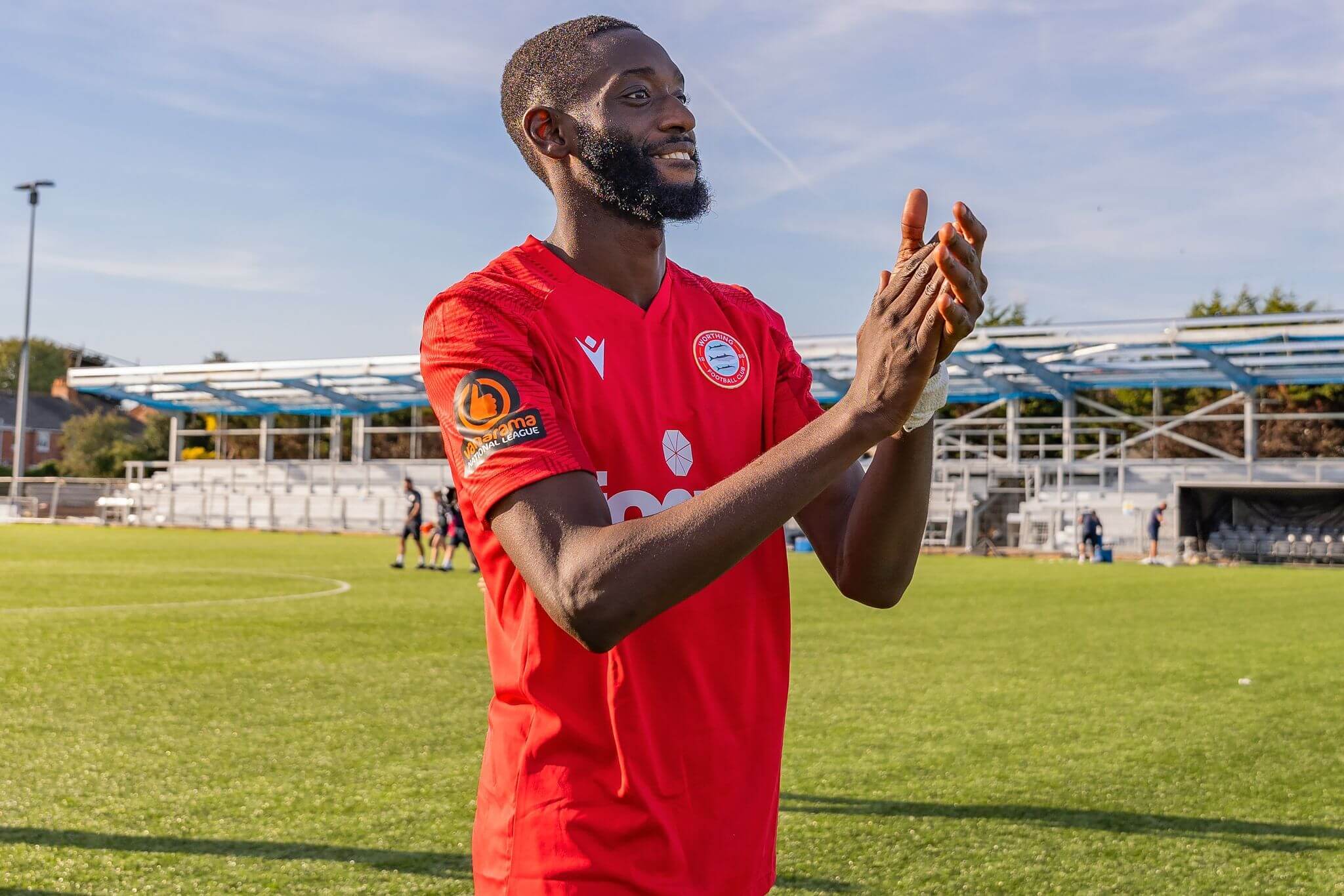
In Faal’s mind, after signing that contract with Crawley, he has terms of employment with them — with it being the club’s fault that he cannot be registered, after they refused to negotiate on the extension length. According to Faal and his lawyer, his registration was not a key condition of the contract.
Later, Faal says he was sent a ‘proof of termination of contract’ document to sign — which he believes demonstrates that what he had signed was a legal contract. In the weeks after his initial signing, despite repeated requests, Crawley failed to provide a signed copy of the deal.
Faal has refused to sign the proof of termination document. He feels that he is owed that six-month contract — and is planning to take the club to an employment tribunal.
“This is a straightforward case of the club refusing to honour the contract between the club and player,” says Yunus Lunat, Faal’s lawyer. “We have therefore initiated the legal process (by initially seeking a mediation) to ensure that Muhammadu is appropriately compensated for his losses under the contract.”
For Faal, this is also part of proving that his short spell at Crawley was not a reflection of his ability.
“I know that there have been a lot of people who have gone through something similar in football,” he explains. “Honestly, this has been traumatic. I feel like I need to carry on this case, it’s important.
“For me, it looks like career suicide — I’ve worked hard since Bolton, scored goals year on year, and been given an opportunity at a higher level, only for it to be taken away. People on the outside are probably thinking, ‘Maybe he can’t hack the level, maybe he’s not good enough’. But I think this is my level.”
In recent weeks, he has joined nearby Worthing to play games — dropping back down three divisions to return to the National League South. He now earns less money than he did before the Crawley move. Faal believes he has contracts with both Crawley and Worthing — but is allowed to play because he is only registered with the latter.
When announcing his departure, on September 13, Crawley said Faal had joined Worthing for an “undisclosed fee”.
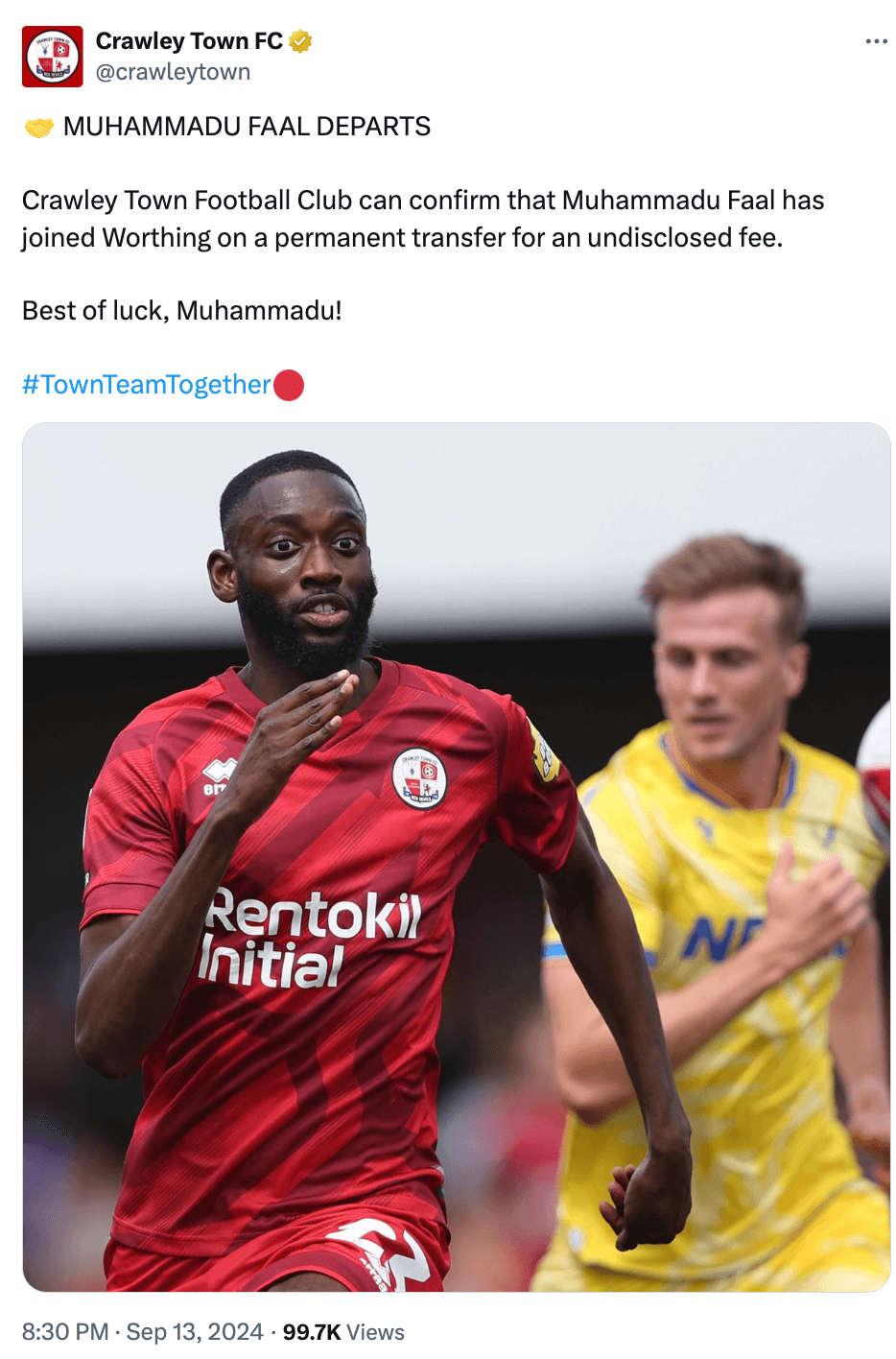
But they would have been unable to receive money for him as an unregistered player — and is instead classed as a free transfer.
Faal says Crawley told him that it was done to help the image of all parties involved. But he feels as if it reflects badly on him, with the lack of transparency making it appear as if they did not fancy him as a player.
“My theory is that there were people at the club who wanted me to begin with, and there were people that didn’t,” he says. “But then, as time went on, I think people changed their mind, and thought to themselves, ‘We’ve not seen enough of him — let’s try and find a loophole to get rid of him’.”
When the move has the finish to match 🤩
Muhammadu Faal added another two goals to his #EmiratesFACup tally at the weekend, as @WorthingFC marched into the first round proper 🐟 pic.twitter.com/MLI1ZRwYw4
— Emirates FA Cup (@EmiratesFACup) October 15, 2024
Faal is now back in the goals — on October 12, he scored twice to send Worthing into the first round proper of the FA Cup. Two weeks later, he scored and added two assists in a thrilling 4-3 win against Slough Town. But still, the circumstances of his time at Crawley have left bitterness, with the prospect of professional football, a first proper home, and the realisation of his potential snatched away.
“I wasn’t just building a life,” he says forcefully. “I’ve got a life. I was going to move my whole life for Crawley. I was willing to take that risk. It just crumbled right in front of me.
“They’ve wrecked my opportunity, and my second chance.”
(Top image: Crawley Town)
